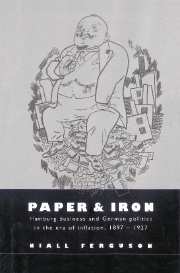Book contents
- Frontmatter
- Contents
- List of figures
- Preface
- List of abbreviations
- Introduction
- 1 Golden years
- 2 The sinews of war
- 3 The political economy of revolution
- 4 Versailles and Hamburg
- 5 Relative stabilisation
- 6 The failure of ‘fulfilment’
- 7 Dissolution and liquidation
- 8 The legacy of the inflation
- Epilogue: Hitler's inflation
- Appendix
- Bibliography
- Index
Epilogue: Hitler's inflation
Published online by Cambridge University Press: 14 October 2009
- Frontmatter
- Contents
- List of figures
- Preface
- List of abbreviations
- Introduction
- 1 Golden years
- 2 The sinews of war
- 3 The political economy of revolution
- 4 Versailles and Hamburg
- 5 Relative stabilisation
- 6 The failure of ‘fulfilment’
- 7 Dissolution and liquidation
- 8 The legacy of the inflation
- Epilogue: Hitler's inflation
- Appendix
- Bibliography
- Index
Summary
The fear of inflation prevented the adoption of radical counter–cyclical policies before 1933. However, it did not prevent voters from turning to Hitler; despite the fact that, on numerous occasions in 1931 and 1932, he was accused of advocating inflationary policies. For example, Briining used the fear of inflation as a stick with which to beat Hitler during the Presidential elections; while labour leaders like Aufhauser and Stegerwald alleged that Hitler was attracting big business support by offering a ‘second inflation’. This was partly because Hitler had long since established his credentials as an opponent of inflation. As early as 1922, he had decried ‘this weak republic [which] throws its pieces of paper about wildly in order to enable its party functionaries […] to feed at the trough’ and NSDAP election propaganda repeatedly cited the inflation as evidence of the Weimar Republic's economic incompetence. Contrary to the predictions of Hitler's oppone
nts, the Nazis continued to stress their commitment to price stability once they had come to power. ‘Future monetary policy,’ declared Schacht in a radio broadcast immediately after his appointment in March 1933, ‘will adhere with unchanging steadfastness to the task of maintaining the value of the mark’ a view explicitly endorsed by Hitler in the Reichstag five days later. Throughout the 1930s and into the war, opposition to ‘monetary experiments’ was a recurrent theme of Nazi rhetoric: as Hitler put it in 1939, the Reichsbank's task was ‘to secure the absolute stability of wages and prices’; the reichs mark was to be ‘the most stable [currency] in the world’.
- Type
- Chapter
- Information
- Paper and IronHamburg Business and German Politics in the Era of Inflation, 1897–1927, pp. 463 - 476Publisher: Cambridge University PressPrint publication year: 1995



